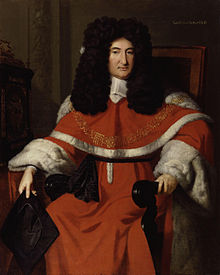Rose v Royal College of Physicians
Following a two-year debate on the definition of "physick", evidence supplied by butcher John Seale and the RCP was used in court to successfully prosecute Rose for practising 'physick' and administering medicines.
However, fearing that the suit would lead to an infringement of their privileges as a whole profession, and in support of Rose, the Society of Apothecaries applied for a writ of error and the House of Lords swiftly reversed the judgement.
Apothecaries were the lowest category of doctor, originating from general shopkeepers, gaining a separate identity from 1617 and establishing a right to treat the sick during the Plague of 1665, when many physicians and their rich patients fled London.
Being university-educated, physicians ranked highest in status, relied heavily on good bedside manner, made diagnoses and wrote prescriptions, but did not dispense medicines.
"[5] During the trial, Rose was an influential and high ranking liveryman of the Society of Apothecaries, associating with London's wealthiest citizens.
[7] Another brother, Fulke Rose, was an early colonist of Jamaica whose widow eventually married Sir Hans Sloane.
[10] The founding RCP charter of 1518 had established the duty of the censor as to "enquire about all practitioners of medicine ... to examine, correct and govern them, if necessary to prosecute them".
[5] Apothecaries originated in the supply of medicinal spices and herbs, gained a separate identity from grocers in 1617, and established a right to treat the sick during the plague of 1665, when many physicians and their rich patients fled London.
His charge was that without any official licence or instruction from a physician and exclusive of any fee, he did practise 'physick' as well as prepared and administered medicines to Seale.
[14] After paying Rose a “vast sum of money” and subsequently receiving a further bill of £50 (equivalent to £10,300 in 2023), Seale turned to a London dispensary where cheaper medicines provided him with a quicker cure.
Seale was angry enough to speak to a committee of censors at the College in Warwick lane, accusing Rose of giving him 'physick' from 5 December 1699 to January 1700.
Sir John Holt, leading Whig judge, made his judgement and fined Rose £5, equivalent to one month’s practice (about £1025 in 2023).
[13] Upon the advice of the attorney-general, the Society of Apothecaries applied for a writ of error in the House of Lords, requesting that the judgement be reversed[16] and Rose be relieved of the penalty imposed upon him.
They accused the physicians of monopolising “physick”, which if continued, would be a burden and damaging to people who when slightly ill would not be able to obtain medicines without consulting and giving a fee to member of the College.
As a result they had been compelled to open dispensaries in London so that the poor could see a physician for free and pay for medicines at a lesser cost.
Cooke takes the view that the success of the appeal did not change medical practice but merely legitimised what apothecaries were doing already and confirmed the "status quo".
[27] In addition, he states the importance of the case in the development of general practice extending into the twentieth century and that the judgement may have "perpetuated the inferior status of the apothecary by underlining his financial dependence on the sale of goods rather than his expert knowledge and advice".




